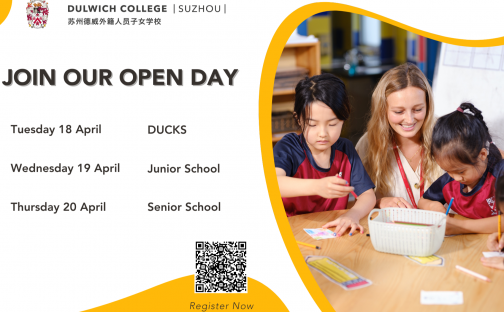Subject Spotlight:Unusual Music Learning at DCSZ
Do you truly understand what students can learn through music? Do you think music learning is only about theory or instruments? What goes on in our classrooms? How do our expert teachers plan and deliver lessons that help students reach their full academic potential?
Last time we posted our Subject Spotlights series of Business, English, Chemistry, Physics, Drama, CS and Geography.
This time we interviewed Mr Edmund Shellard, our Director of the arts, who gave us some insights into the music studies at our college.
As the Director of the Arts, Mr Shellard oversees creating and performing arts across the College. This article will focus more on music, which is also Mr Shellard’s specialism.
Hello Mr Shellard! Firstly, could you please introduce yourself and your teaching background?
I have been teaching music for more than 10 years. I graduated from Cardiff University with a degree in Music, followed by an MMUS in Music Composition. I learnt clarinet and viola as major instruments, but my specialism was composition. After that, I worked in Wells Cathedral School for 2 years as a music assistant and a boarding teacher. It was a thrilling experience working at Wells Cathedral School, one of the top music specialist schools in the UK, for it gave me an opportunity to see what a rewarding career teaching music to young people could be. I worked at Bristol Cathedral School, another specialist music school, before moving to China and working at Dulwich High School in Zhuhai and now Dulwich College in Suzhou.
Could you briefly introduce the courses you teach at DCSZ?
I teach Key Stage 3 to Key Stage 5 music (Year 7 to Year 13). For KS3, the curriculum builds upon the DUCKS and Junior School music programme, deepening students’ knowledge and understanding in different areas of musicianship: performance skills, composition skills, ensemble skills and music theory. Students are introduced to various musical styles and genres as they develop in these core disciplines.
At IGCSE music (KS4), the curriculum is more focused and in-depth. Students need to have a certain level of instrument skills since there is a solo performance at this stage. The main focus in IGCSE music will be performance, composition and music theory. They have to write two pieces of music as part of the composition component. Students’ music theory and listening skills are also developed and assessed in the form of an exam paper at the end of the course.
For IB music (KS5), there is no exam; it is entirely coursework. There are three main focuses: presenting performances and compositions, exploring and researching genres of music and experimenting with music. Students can go in any direction to pursue their interests and passions in music, and my role is very much a mentor in this process. Not only does the course broaden their knowledge and understanding of music, but it also serves as fantastic preparation for university study generally, thanks to its focus on student autonomy and the development of research skills.
Thanks for that introduction! Please tell us about a unit or lesson that you taught recently.
Take our current Year 9 unit as an example. For the Battle of the Bands, they are preparing for a performance on Founder’s Day, which will also be their final assessment. It is a culmination of the skills and knowledge they have learned in KS3, where they will use their musical talent and creativity to shine on stage. The students take ownership of this project- from song choice, practice sessions and band image- and my role is to guide, coach and support them.
This unit is an excellent example of the value of the performing arts as a subject of study, as students not only improve their skills as musicians, but also uniquely develop many essential soft skills, such as independence, problem-solving, teamwork, self-expression, communication and creativity.
What strategies did you use to support students’ learning in this unit?
One of the aspects of international teaching that I have loved, is that my students come from many different countries and therefore bring to the classroom a variety of cultures and languages. On the face of it may seem a challenge but is in fact an excellent opportunity for students (and me!) to learn and draw from these backgrounds.
Whatever their background, it is crucial students feel involved, engaged, and motivated in my lessons. This might be achieved by including the music in class they are familiar with and enjoy. I also strive to use students’ mother languages in my teaching as much as possible. This may involve me simply greeting them in their language at the start of the lesson, but it often includes students translating key words and concepts in their own language. This can really support students whose English level is not as strong, as it develops a sense of confidence and involvement in the learning. The added pedagogical benefit of these activities is students take an ownership of their learning, but they are also often drawing upon prior learning: many of the students have learnt instruments and may already be familiar with music theory and concepts in their own language.
What can students do if they want to pursue music in the future?
Music is a valued and enjoyable academic subject of study at university, that allows students to either continue to develop in the main disciplines of music or to specialise, in performance for example. For the reasons mentioned earlier, a degree in music does not limit career options, as in fact employers greatly value the skillsets musicians bring. Nevertheless, there are many rewarding career options in music and students should talk to someone with a music background for advice.
Ultimately, my goal is to instill in students a deep appreciation for the creative and performing arts, so that they can find a meaningful place for these areas in their lives. By doing so, they can experience the transformative power of the arts and develop a lifelong passion for artistic expression.
Thanks to Mr Shellard for introducing his recent units and explaining what music learning is like at DCSZ.



If you are interested in understanding how our English as an Additional Language and Mandarin Learning Pathways can help your child excel, join us now






